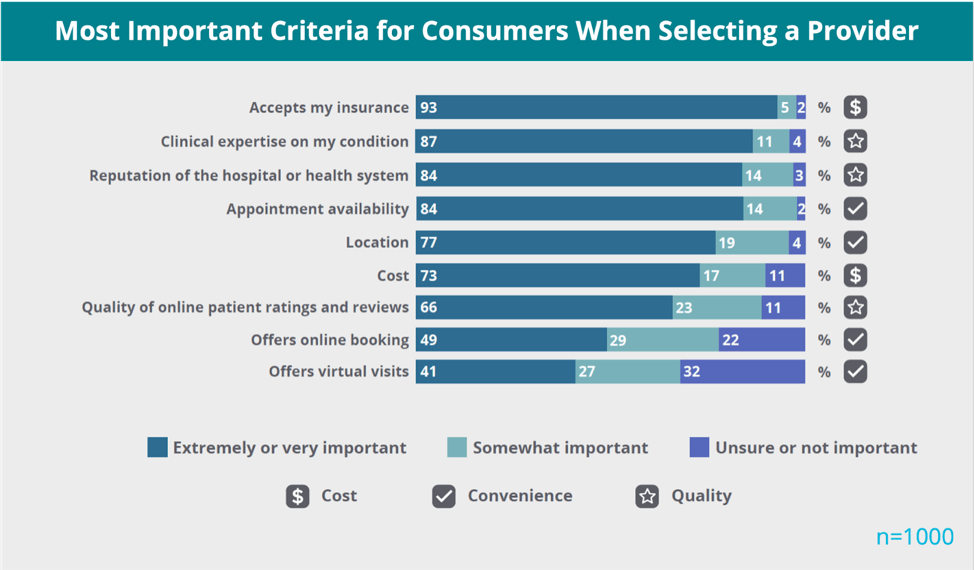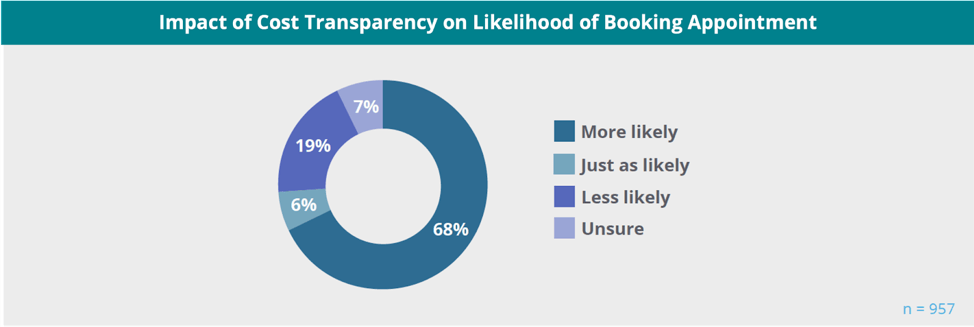People have continued to evolve as they search for and select care—adopting sophisticated shopping behaviors similar to other consumer focused industries. The “digital front door” has been a critical element of patient access strategies across healthcare organizations for years, and has evolved to encompass “many doors” where consumers look to find key information needed to select new care options online.
For the last six years, Kyruus (HealthSparq’s parent company) has surveyed consumers to understand the changing trends in how they find, select, and access care across the broadening journey. This year’s report, including insights from 1,000 consumers, revealed that while consumers look to multiple sources in their selection process, health plan websites and resources continue to show up as a top destination for making care decisions.
Take a look at look at some of the key insights from the 2022 survey to understand how health plans can play a key role in the consumer journey to care:
Consumers Rely on Health Plans as a Trusted Source in Their Search for Care
While general internet searches (33%) continue to claim the top spot consumers consult first when searching for a new provider, accessing a health plan website follows as a close second (28%). Additionally, consumer trust in health plans is rising over time as 20% of consumers noted health plans (both online and offline) as the most trustworthy source to find and select care—up nine percentage points since the 2021 survey.
WHY IT MATTERS: Trust plays a huge role for people when seeking information about new healthcare providers or services, and health plans have a major opportunity to continue building trust with members by offering easy to use, data rich care search experiences.
Cost Transparency is Pivotal to Care Selection
Similar to other industries, consumers have made it clear that factors related to cost, quality, and convenience are most influential to their care selection process. The top criteria continue to be insurance acceptance (93%), clinical expertise on their condition (87%), reputation of the hospital or health system (84%), and appointment availability (84%). Digging deeper into understanding cost-related factors, transparency into the cost of care is absolutely critical in the selection process —95% of consumers consider some kind of cost information and 68% say they would be more likely to book medical appointments when they have visibility into the expected cost of care.
Digging deeper into understanding cost-related factors, transparency into the cost of care is absolutely critical in the selection process —95% of consumers consider some kind of cost information and 68% say they would be more likely to book medical appointments when they have visibility into the expected cost of care.
Impact of cost transparency on likelihood of booking appointment chart
WHY IT MATTERS: Cost-related information is highly valued by members in the search for care— and they are looking for the best resource to find this information. Health plans have a unique opportunity to both offer cost transparency information and help guide and educate members on their journey—helping them select the best care option in the process.
Self-Service Options are Non-Negotiable for Consumers
Interest in digital self-service has consistently been on the rise over the last few years, across generations, as evidenced in consumers’ preference for online scheduling (40% prefer online scheduling to other channels). And, even though more consumers still prefer to book via phone, they experience varying outcomes when doing so—about 1/5 report long hold times when calling to book care, and of those, nearly 1/3 were unsuccessful in their attempt to book care. WHY IT MATTERS: With preference for digital self-service rising, it’s a no-brainer for health plans to make convenient tools like online scheduling available to offer members the convenience and flexibility they seek while reducing burden on call center resources.
WHY IT MATTERS: With preference for digital self-service rising, it’s a no-brainer for health plans to make convenient tools like online scheduling available to offer members the convenience and flexibility they seek while reducing burden on call center resources.

READ KYRUUS’ 6TH ANNUAL PATIENT ACCESS SURVEY OF 1,000 CONSUMERS
Download The Many Digital Doors of Patient Access and Engagement, Kyruus’ 6th Annual Patient Access Journey Report, to learn consumers’ latest thinking on how they find care, the critical factors that impact selection, and the increased importance of digital self-service across the patient access journey.



